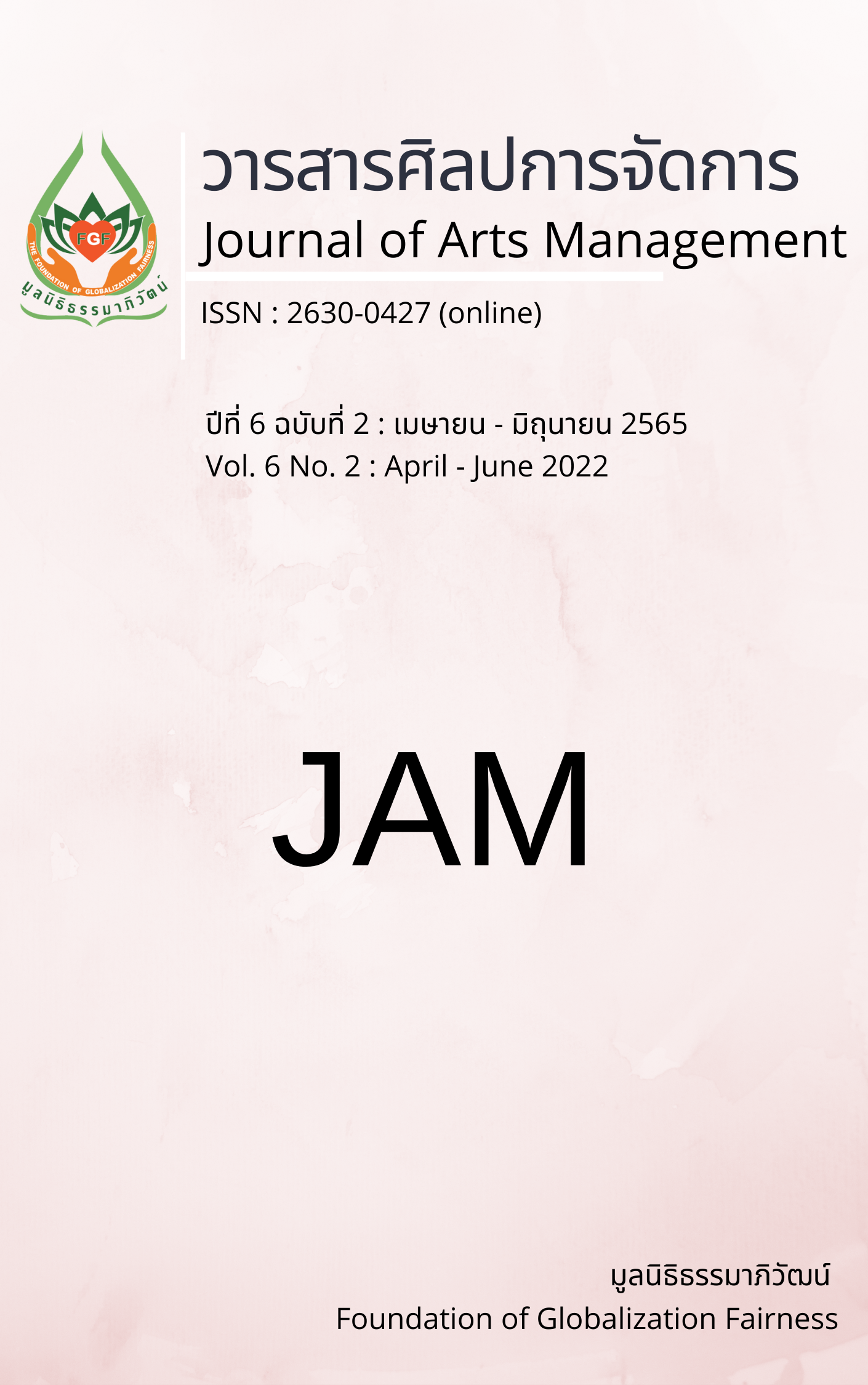Causal Relationship Model of Factors Influencing in Behavioral Intention of Buriram Marathon 2022 Participants
Main Article Content
Abstract
This article aimed to 1) study direct and indirect effects of service quality, destination attributes, and satisfaction on the behavioral intention of Buriram Marathon 2022 participants and 2) examine a causal relationship model of factors influencing the behavioral intention of Buriram Marathon participants. This research was quantitative research and employed the questionnaire with a reliability value at 0.893. A sample of 390 Buriram marathoners participated in the length of 42.195 kilometers. The data were analyzed by using Confirmatory Factor Analysis and Structural Equation Model.
The research results were as follows: 1) a causal relationship model of factors influencing in behavioral intention was fit with having 2 = 197.58, df = 84,
2/df = 2.35, P-value 0.000, RMSEA = .0593, RMR = .0466, SRMR = .0466, CFI = .97, GFI = .936, AGFI = .908, CN = 233.488 and 2) service quality and destination attribute had the direct effect on satisfaction with a statistical significance at .05, the influence coefficient at .446 and .421. and the determination coefficient at .672. These factors also had an indirect effect on behavioral intention, with an influence coefficient at .242 and .228. Likewise, satisfaction had the direct effect on behavioral intention with a statistical significance at .05, the influence coefficient at .541 and the determination coefficient at .298.
Article Details

This work is licensed under a Creative Commons Attribution-NonCommercial-NoDerivatives 4.0 International License.
Views and opinions appearing in articles in the Journal of Arts of Management It is the responsibility of the author of the article. and does not constitute the view and responsibility of the editorial team I agree that the article is copyright of the Arts and Management Journal.
References
Alexandris, K., Kouthouris, C., Funk, D., & Chatzigianni, E. (2008). Examining the relationships between leisure constraints, involvement and attitudinal loyalty among Greek recreational skiers. European Sport Management Quarterly, 8(3), 247-264.
Bigné, E., Mattila, A., & Andreu, L. (2008). The Impact of Experiential Consumption Cognitions and Emotions on Behavioral Intentions. Journal of Services Marketing, 22, 303-315.
Boonsiritomachai, W., & Phonthanukitithaworn, C. (2018). Destination attributes that attract marathon runners: a case study of the Bangsaen21 half marathon. Modern Management Journal, 16(1), 251-262.
Brady, M. K., & Cronin Jr, J. J. (2001). Some new thoughts on conceptualizing perceived service quality: a hierarchical approach. Journal of marketing, 65(3), 34-49.
Buhalis, D. (2000). Marketing the competitive destination of the future. Tourism Management, 21(1), 97-116.
Buriram Marathon. (2022). Buriram Marathon 2021 ready to push for the world major. https://burirammarathon.com
Chen, X., Yim, B. H., Tuo, Z., Zhou, L., Liu, T., & Zhang, J. J. (2021). “One Event, One City”: Promoting the Loyalty of Marathon Runners to a Host City by Improving Event Service Quality. Sustainability, 13(7), 3795-3808.
Cooper, C., Fletcher, J., Gilbert, D., Fyall, A., & Wanhill, S. (1993). Tourism: Principles and practice. Pearson education.
Eusébio, C., & Vieira, A. L. (2013). Destination attributes' evaluation, satisfaction and behavioural intentions: A structural modelling approach. International Journal of Tourism Research, 15(1), 66-80.
Fornell, C., & Larcker, D. F. (1981). Structural equation models with unobservable variables and measurement error: Algebra and statistics. Journal of Marketing Research. 18(3), 382-388.
Hair Jr, J., Sarstedt, M., Hopkins, L., & G. Kuppelwieser, V. (2014). Partial least squares structural equation modeling (PLS-SEM). European Business Review, 26(2), 106-121.
Higham, J. (1999). Commentary Sport as an Avenue of Tourism Development: An Analysis of the Positive and Negative Impacts of Sport Tourism. Current Issues in Tourism, 2(1), 82-90.
Hinch, T., & Higham, J. (2005). Sport, tourism and authenticity. European Sport Management Quarterly, 5(3), 243-256.
Huang, C.-H., Liu, W.-T., Chuang, C.-L., & Huang, Y.-H. (2018). The service quality and community attribute effect impacts on satisfaction for marathon event. International Journal of Economics and Business Administration, 4(3), 105-109.
Jeong, Y., Kim, S.-K., & Yu, J.-G. (2019). Determinants of behavioral intentions in the context of sport tourism with the aim of sustaining sporting destinations. Sustainability, 11(11), 3073-3088.
Kaplanidou, K., & Vogt, C. (2007). The interrelationship between sport event and destination image and sport tourists' behaviours. Journal of Sport & Tourism, 12(3-4), 183-206.
Kouthouris, C., & Alexandris, K. (2005). Can service quality predict customer satisfaction and behavioral intentions in the sport tourism industry? An application of the SERVQUAL model in an outdoors setting. Journal of Sport & Tourism, 10(2), 101-111.
Ogles, B. M., & Masters, K. S. (2003). A typology of marathon runners based on cluster analysis of motivations. Journal of Sport Behavior, 26(1), 69-85.
Oliver, R.L. (2010). Satisfaction: A Behavioral Perspective on the Consumer: A Behavioral Perspective on the Consumer. Routledge.
Prayag, G., Hosany, S., Nunkoo, R., & Alders, T. (2013). London Residents' Support for the 2012 Olympic Games: The Mediating Effect of Overall Attitude. Tourism Management, 36, 629-640.
Reichheld, F. F. (1996). Learning from customer defections. Harvard business review, 74(2), 56-67.
Theodorakis, N. D., Kaplanidou, K., & Karabaxoglou, I. (2015). Effect of event service quality and satisfaction on happiness among runners of a recurring sport event. Leisure Sciences, 37(1), 87-107.
Xiao, Y., Ren, X., Zhang, P., & Ketlhoafetse, A. (2019). The effect of service quality on foreign participants’ satisfaction and behavioral intention with the 2016 Shanghai International Marathon. International Journal of Sports Marketing and Sponsorship, 21(1), 91-105.
Yoshida, M., & James, J. (2010). Customer satisfaction with game and service experiences: Antecedents and Consequences. Journal of Sport Management, 24, 338-361.
Žabkar, V., Brenčič, M. M., & Dmitrović, T. (2010). Modelling perceived quality, visitor satisfaction and behavioural intentions at the destination level. Tourism Management, 31(4), 537-546.


